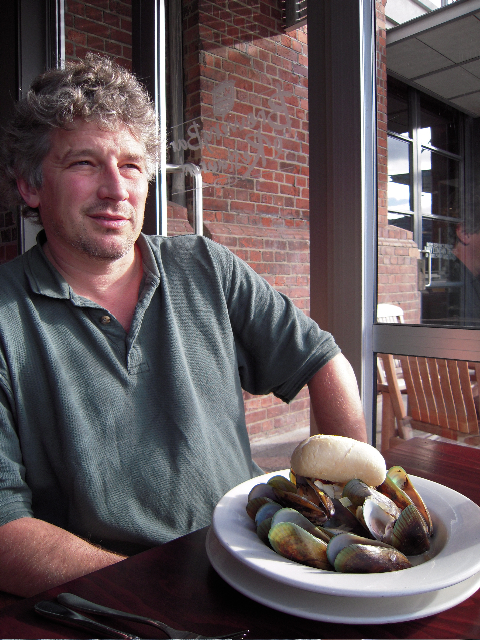Some of you may remember the 2004 International Association for Food Protection meting in Phoenix. At a local supermarket I found this sanitizing system for shopping carts displayed prominently. That’s when I started to think, maybe food safety can be marketed.
 A few months later and I was in the Gold Coast, Australia, for a food safety meeting. I told one journalist about this new trend I’d observed –always gotta be trendspotting – of more prominent use of sanitizers in grocery stores.
A few months later and I was in the Gold Coast, Australia, for a food safety meeting. I told one journalist about this new trend I’d observed –always gotta be trendspotting – of more prominent use of sanitizers in grocery stores.
That turned into,
“Doug Powell, a food safety expert from Canada, says a decision to put hand wipes in supermarkets and provide sanitising towels for shopping trollies has been successful in reducing the number of food poisoning cases in the US and Canada.”
And it ran all over Australia.
So I wrote a letter which was published in the Sydney Morning Herald and read in part,
“The use of hand wipes in supermarkets and sanitizing towels for shopping carts has been experimental at best in the U.S., and has not and cannot be correlated with any reduction in foodborne illness (Shoppers urged to clean hands to wipe out food-borne diseases, October 11/04, Sydney Morning Herald).
“However, as the Food Safety Information Council correctly noted, and as I stressed during the interview, any measure — whether on the farm, in processing, at food service, in the home, and yes, at retail — that can enhance food safety awareness should be explored and encouraged.”
Now it appears some such work has been done.
USA Today reports today that supermarkets and other retailers that provide shopping carts are increasingly looking to limit germ exposure for customers and their families.
“A ShopRite supermarket in Passaic, N.J., installed a push-through cleaning machine on Tuesday that sprays each shopping cart between uses with a misty peroxide solution to kill bacteria, according to Jim Kratowicz, president of PureCart Systems, the manufacturer of the machine. …
“Studies conducted in 2006 and 2007 by FoodNet found riding in a shopping cart beside meat and poultry is risky for infants under six months.
“Doing so triples the chance they may contract salmonella and quadruples it for campylobacter, a diarrhea illness, according to Olga Henao, an epidemiologist for the CDC.
“Infants can become ill when they transfer bacteria from the packaging into their mouths, Henao said. Also, if raw juices leak out onto the cart, it can create a bacteria risk for the next infant in the cart, she said.”
Trendspotting is just so hip. Here’s Demetri Martin with his own trendspotting.
 The person who died is believed to have contracted the illness overseas, while four others in Canterbury are thought to have become infected since September through contact with potting mix.
The person who died is believed to have contracted the illness overseas, while four others in Canterbury are thought to have become infected since September through contact with potting mix.
 Consumers in Belgium are just beginning to enjoy the annual harvest of so-called Belgica mussels. According to a report forwarded by our
Consumers in Belgium are just beginning to enjoy the annual harvest of so-called Belgica mussels. According to a report forwarded by our  To continue on with the wiki-ized history, the name
To continue on with the wiki-ized history, the name  A few months later and I was in the Gold Coast, Australia, for a food safety meeting. I told one journalist about this new trend I’d observed –always gotta be trendspotting – of more prominent use of sanitizers in grocery stores.
A few months later and I was in the Gold Coast, Australia, for a food safety meeting. I told one journalist about this new trend I’d observed –always gotta be trendspotting – of more prominent use of sanitizers in grocery stores.